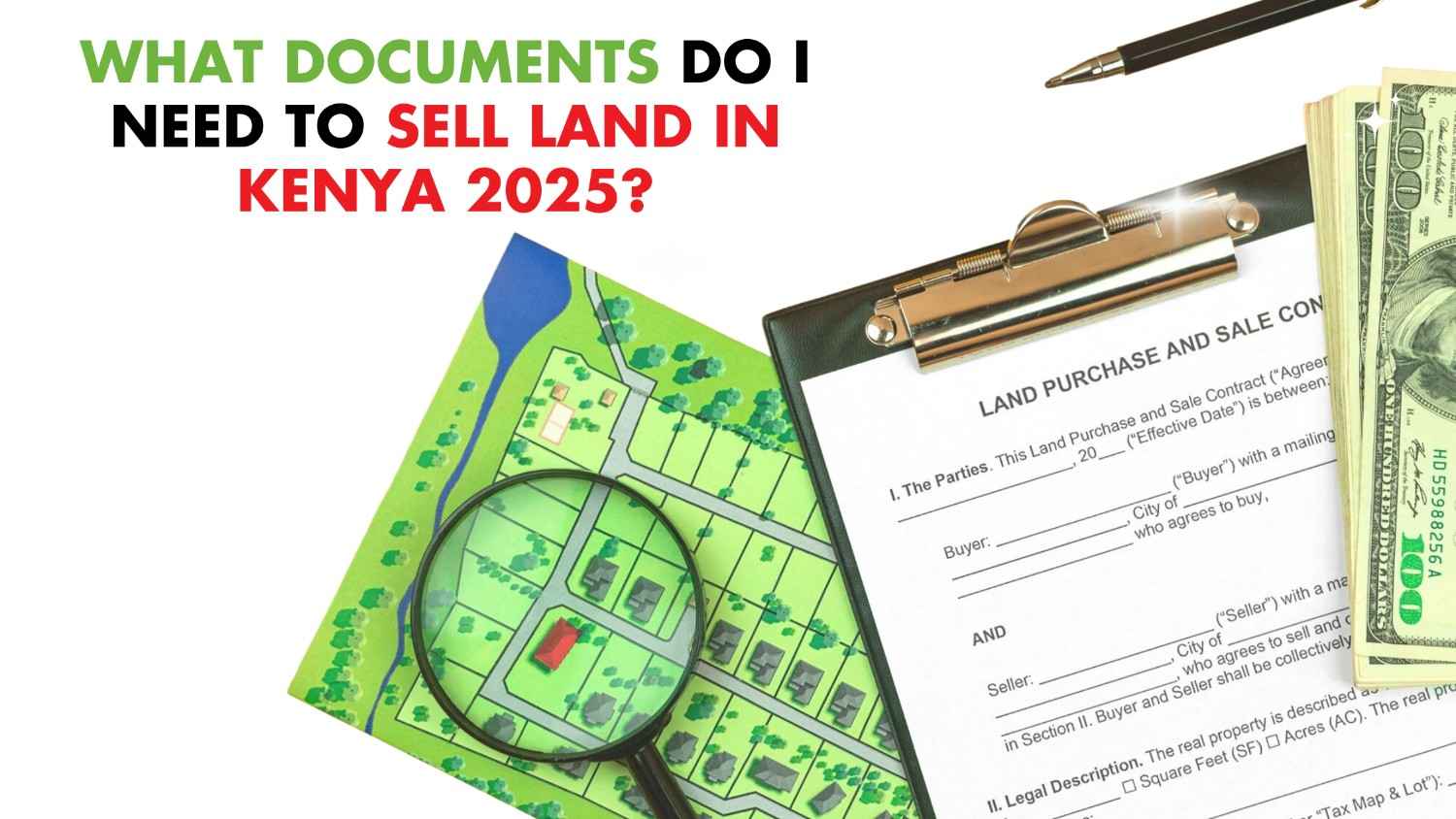Are you thinking of selling land in Kenya? Discover the must-have documents that fast-track your sale, avoid costly delays, and close deals confidently in 2025, your ultimate checklist awaits!
Key Takeaway
Before we get into the details, here’s a quick checklist to keep at the front of your mind. These are the essentials you must have to sell land in Kenya smoothly in 2025:
✅ Original Title Deed — Proof of ownership, no compromise.
✅ Land Search Certificate — Confirms no disputes or debts.
✅ Land Rates Clearance Certificate — Shows county rates are paid.
✅ Sales Agreement — Legal contract protecting both parties.
✅ Consent to Transfer — Official approval for the transfer.
✅ KRA PIN & National ID — Identification and tax compliance.
✅ Mutation Form & Survey Map — For subdivided land sales.
✅ Capital Gains Tax Payment Receipt — Confirms CGT paid.
✅ Land Rent Clearance Certificate — Especially for leasehold properties.
✅ Spousal Consent Form — If married, legal requirement.
✅ Valuation Report — For correct stamp duty assessment.
✅ Tax Compliance Certificate — General proof of good tax standing.
✅ Lawyer’s Letter of Instruction — Ensures smooth processing.
Trust me, when you have all these in place, you’re not just selling land—you’re selling peace of mind.
1. Original Title Deed
Let’s start with the heart of the matter: the Title Deed.
If you think about it, this is your land’s birth certificate—it proves that you are the rightful owner. Without this piece of paper, you simply cannot move forward.
There are two main types:
- Freehold Title Deed: This gives you total ownership, forever. It’s the golden standard, especially for rural and agricultural land.
- Leasehold Title Deed: The government grants you ownership for a set period, usually 99 years, though sometimes less.
If your title deed is lost or damaged, don’t panic. Go to the police, get an abstract, and apply for a replacement early. Also, make sure it’s genuine and updated. Nothing frustrates buyers more than a title deed mismatch at the last minute.
2. Land Search Certificate
Okay, next—let’s talk about trust.
No buyer will take your word for it alone. They want official proof that:
- You’re the registered owner.
- The land isn’t tied up in disputes or debt.
- There are no third-party claims.
This is where the Land Search Certificate comes in. It’s quick to get and costs just about Ksh. 500. Simply visit the Ministry of Lands or do it online via the eCitizen portal.
Pro Tip: Even if the buyer is likely to do their own search, beat them to it. It shows you’re serious and ready. Plus, you avoid surprises like hidden caveats or unpaid loans attached to the property.
3. Land Rates Clearance Certificate
Now, let’s move to taxes because, as you know, nothing is certain except death and taxes!
If your land falls under a county government jurisdiction, you’re required to clear any outstanding rates. This means property taxes owed to the local authority. Without the Land Rates Clearance Certificate, the transfer can’t happen. Counties like Nairobi and Nakuru are very strict about this.
Good news? It’s easy to obtain:
- Visit your county office or use available online portals.
- Provide your title deed and plot details.
- Settle any pending payments.
- Walk away with your clearance certificate.
Pro tip: Keep your old receipts handy. They can speed things up dramatically.
4. Sales Agreement
Here’s where things start to feel real.
The Sales Agreement is your official handshake in writing. It outlines:
- The agreed purchase price.
- Payment schedule.
- Completion timelines.
- Any conditions both parties have agreed to.
You’ll definitely want a trusted lawyer to draft this. Avoid shortcuts here! Verbal agreements are risky, and generic templates from the internet won’t hold up if things go sideways.
Remember, a strong sales agreement protects both you and the buyer, ensuring a smooth transaction from start to finish.
5. Consent to Transfer
Now, even if you and the buyer agree and have your documents ready, the government needs to give its blessing.
If your land is:
- Agricultural — You need approval from the Land Control Board (LCB).
- Urban property — Consent comes from the Ministry of Lands.
LCB meetings happen monthly and cost about Ksh. 1,000 for approval. Without this consent, any sale agreement is legally void!
So, don’t skip this step. Schedule your LCB appointment early or check the Ministry timelines if it’s urban property. It’s a small fee for peace of mind.
6. KRA PIN & National ID
Let’s not forget tax compliance and identity verification.
Both you and the buyer need to produce:
- A valid Kenyan National ID
- A valid KRA PIN Certificate
Why? The government charges Stamp Duty and Capital Gains Tax during the transaction. Your KRA PIN ensures tax tracking and smooth processing.
For foreigners selling land in Kenya:
- Add a valid passport and work permit.
Simple tip: Double-check your details on the iTax portal to make sure they’re up to date before you begin.
7. Mutation Form & Survey Map
If you’re selling a subdivided portion of your land, this is crucial.
A Mutation Form records the changes in land size and ownership. You’ll need:
- A licensed surveyor to prepare the form.
- Approval from the Ministry of Lands.
Without this, you legally cannot transfer part of your land. It’s like trying to sell a slice of cake without first cutting it properly!
8. Capital Gains Tax (CGT) Payment Receipt
When you sell land and make a profit, the taxman wants his share.
The Capital Gains Tax (CGT) is currently set at 5% of your profit.
You’ll need to:
- File through the iTax portal.
- Pay before you begin the transfer process.
Delay this step, and you delay your sale. It’s that simple.
9. Land Rent Clearance Certificate
If you’re selling leasehold land, don’t overlook this.
The Land Rent Clearance Certificate confirms that you’ve paid all annual rents due to the Ministry of Lands. Without it, your transfer application will hit a dead end
10. Spousal Consent Form
Selling a matrimonial property? Your spouse needs to give formal consent—even if the property is in your name alone.
Get a spousal consent form signed and witnessed by an advocate. This protects both parties and avoids future disputes.
11. Valuation Report
The government needs a Valuation Report to calculate the correct stamp duty payable by the buyer.
Hire a licensed valuer for this, and make sure the valuation is recent. A good valuation report also reassures the buyer they’re paying a fair price.
12. Tax Compliance Certificate
While not always mandatory, having a Tax Compliance Certificate strengthens your profile as a seller—especially for corporate sellers or high-value transactions.
Get this from KRA to show you’re in good standing.
13. Lawyer’s Letter of Instruction
Finally, a professional touch.
Your lawyer can issue a Letter of Instruction to formally direct the transaction, ensuring there are no hiccups along the way.
This keeps everyone aligned—buyer, seller, registrar, and county offices.
Conclusion: Seal the Deal With Confidence
Selling land in Kenya doesn’t have to be stressful. With the right documents, you move from worrying about delays to confidently shaking hands with your buyer and closing the deal. Always stay proactive—gather your documents early, verify their accuracy, and involve professionals when needed.
The result? A smooth, quick, and rewarding transaction.
FAQs
Q1: What documents are required for the sale of land in Kenya?
To legally sell land in Kenya, you’ll need your original title deed, land search certificate, clearance certificates (land rates and land rent), KRA PIN, National ID, sales agreement, consent to transfer, mutation form (if subdividing), capital gains tax receipt, and spousal consent (if married). Engaging a lawyer is strongly advised to ensure everything is correct and compliant.
Q2: What is required when selling a piece of land?
You must prove ownership and tax compliance. Prepare your title deed, clearance certificates, KRA PIN, and ID, and ensure all rates and taxes are paid. Also, get consent to transfer, and if it’s a portion of land, a mutation form. A well-drafted sale agreement and legal assistance will fast-track your transaction.
Q3: How to sell land quickly in Kenya?
To sell land fast, have all your documents ready in advance. Clear any pending land rates or disputes, use professional agents or platforms like Propcart, and set a competitive market price. Engage a qualified lawyer to prepare your documents promptly and target serious, verified buyers.
Q4: What is the best way to sell my land?
The best way is to list your property through trusted real estate platforms, work with reputable agents, and ensure all legal documents are in order. A clear title, proper pricing, professional valuation, and legal support will help you attract genuine buyers and close the deal efficiently.
Q5: Can I sell land without a title deed in Kenya?
No. Without the original title deed, you legally cannot sell land in Kenya. Always ensure your title deed is genuine, updated, and in your possession before initiating the sale.
Q6: How long does the land sale process take in Kenya?
Generally, it takes between 30 to 90 days. Delays happen mostly due to incomplete documents or slow consent approvals. Preparing everything early speeds things up significantly.
Q7: Do I need spousal consent to sell land?
Yes. Kenyan law requires spousal consent, especially for matrimonial property. It protects both parties legally and prevents future disputes over ownership or sale validity.
Q8: How do I know if my land is genuine?
Conduct a land search at the Ministry of Lands. It confirms ownership and reveals any encumbrances, disputes, or third-party claims attached to your property.
Q9: Must I pay taxes when selling land in Kenya?
Yes, sellers must pay Capital Gains Tax (CGT) at 5% of the net gain. Buyers also pay stamp duty, but CGT is your responsibility as the seller.



